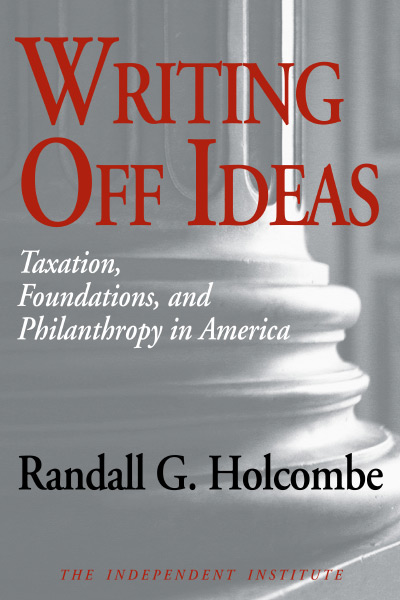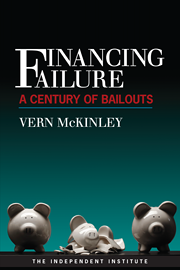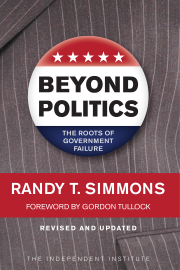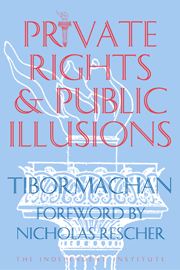| List Price: | ||
| Price: | $6.24 | |
| Discount: | $18.71 (Save 75%) |
| List Price: | ||
| Price: | $6.24 | |
| Discount: | $18.71 (Save 75%) |
Overview
In the late 20th century, tax-exempt foundations have grown substantially both in their financial importance and in the scope of their activities.Today, a large accelerating percentage of wealth is being placed into foundations for tax purposes. Writing Off Ideas now examines the economic, cultural, and intellectual implications of tax-exempt organizations.
- How do various tax laws influence foundations and the types of ideas they support?
- How do the activities of foundations relate to the interests and intentions of their founders?
- Does the economic management of foundation assets serve the public good?
- Would such assets be better employed through the private market process?
- Does the tax law create organizations shielded from economic realities and true social needs, producing a philanthropic subculture that squanders resources, fosters questionable ideologies, and launches foolish crusades?
- What would be the impact of the flat tax, reduction or abolition of estate taxes, proposals to increase either the amount allowed to be given away each year without penalty or to mandate the amount at higher percentages of income?
Contents
- Chapter 1: Introduction
- Chapter 2: The Origins and Development of Foundations
- Chapter 3: The Ideas They Promote
- Chapter 4: Tax Laws and Their Influence on Foundations
- Chapter 5: Trends and Biases in Foundation Funding
- Chapter 6: Donor Intent
- Chapter 7: Trustees and the Direction of Foundations
- Chapter 8: The Accountability of Non-Profit Foundations
- Chapter 9: The Role of Non-Profit Foundations in the Economy
- Chapter 10: Policy Issues
- Appendix
Detailed Summary
- Baby boomer children will inherit $12 trillion dollars between now and 2020. But the private foundations those children will use to shelter their inheritance from taxes may run counter to the public interest.
- In 1998, there were over 44,000 grant-making foundations in the United States. These foundations issued approximately $20 billion in grants from an endowment base of some $329 billion. Since most such foundations earn more on their assets than they spend on grants, they grow in size over time.
- Private foundations supported by endowments are rarely accountable to anyone. By their very nature, without independent oversight, the potential remains for these tax-preferred organizations to engage in activities that work against the public interest.
- Free market entrepreneurship made the Fords, Rockefellers, Carnegies, and later philanthropists fabulously wealthy. But the foundations they endowed haven’t always adhered to pro-market ideals, or the intentions and values of the founders.
- The Foundations of Ford, Carnegie, Mellon, and Rockefeller are being eclipsed by names like Gates, Hewlett, and Packard. The Bill and Melinda Gates Foundation, created in 1999, is now the largest foundation, with assets of approximately 17 billion dollars.
- Over the past century, private foundations have mostly supported programs to expand government’s role in society. But since the 1970s, there has been a greater balance among foundation-supported groups.
- Government control of private foundations would reduce support for innovative ideas. But, eliminating estates taxes (“death taxes”) would place other forms of charitable giving on an equal standing with foundations and would reduce incentives to channel and lock up wealth in private foundations.
Throughout the twentieth century, non-profit foundations grew tremendously and changed their orientation substantially. Early in the century, large private foundations, created by the wealth of entrepreneurs such as Rockefeller, Ford, Mellon, and Carnegie, directed their resources toward projects that could show tangible benefits, such as curing diseases, building libraries, and endowing educational institutions. Although foundations still devote considerable resources to these causes, increasingly they are funding programs oriented towards evaluating and changing government policy. Issues of international affairs, educational policy, and social and economic policy more generally have received substantial funding from private foundations. WRITING OFF IDEAS surveys the history and present status of foundations–focusing on the ideas they promote and their influence on political and cultural society. The history of foundations raises a number of questions of public policy that WRITING OFF IDEAS examines in detail.
- The tax system gives highly preferential treatment to foundations. Are such benefits justified?
- Who monitors private foundations and to whom are they accountable?
- Should private foundations live forever?
- Is greater government oversight of foundations warranted or would such policies be injurious to the public welfare?
Of the many examples of politicized philanthropy, the Ford Foundation has been among the most politically-oriented of all foundations. In the 1960s, for example, the Foundation supported the Mexican American Youth Organization (MAYO) which was dedicated to furthering the welfare of Hispanics by supporting socialism. Members of MAYO frequently visited Cuba and disseminated pro-Castro propaganda to Mexican-Americans. And in 1967, the foundation worked with the then left-liberal Congress of Racial Equality to undertake a voter registration drive in the predominantly black areas of Cleveland, Ohio, when Carl Stokes, a black candidate for mayor, was running against white candidate Seth Taft. Following the registration drive, Stokes was elected. The foundation claimed that the registration drive was aimed at increasing “democratic participation,” evading the fact that the drive was actually a deliberate program in campaign politics, in this case targeting African-Americans to support expanded government policies.
More recent examples of donations with political ramifications include the Robert Wood Johnson Foundation’s donation of $30 million to fund anti-tobacco and anti-drug media campaigns supporting government programs, the Florence and John Schumann Foundation’s $5 million donation to establish a national organization to advance public participation in campaign finance reform and the Lannan Foundation’s $2.6 million donation to support the separatist Independent Traditional Seminole Nation.
Although private foundation giving has traditionally favored “liberal” causes, a number of influential “conservative” programs have increasingly been funded by foundations. Charles Murray’s 1984 book, Losing Ground, for example marshaled an impressive array of statistics to argue that government welfare programs were making the poor worse off by creating incentives for recipients to stay single, have children, and not save for the future. At the time, Murray’s book was highly controversial and widely criticized, but there is little doubt that it profoundly changed the nature of the welfare debate. As Murray relates in the preface to Losing Ground, “the Manhattan Institute took a chance and decided to use the foundation’s resources to underwrite the effort. Without them, the book would not have been written.” Subsequently, Murray took the position of Bradley Fellow at the American Enterprise Institute, which is part of a network of organizations funded by private, conservative foundations. While there, he co-authored with the late Harvard professor Richard Herrnstein, another controversial book, The Bell Curve, published in 1994. Whether one agrees or disagrees with Murray’s work, both books significantly influenced public debate over major policy issues. In all likelihood, neither would have been written without private foundation support.
When Good Intentions Run AmuckPrivate foundations are financed by endowments from their donors, so once a foundation is endowed, it has a continuing source of financing and does not need to raise any additional revenues. The primary problem from a public policy standpoint with such funding is that foundation trustees have a tremendous amount of wealth at their disposal with little accountability. While they are legally charged with acting in the public interest, they are essentially accountable to nobody. In a democracy, governments are allegedly accountable to the voters. Business firms must satisfy their customers and stockholders to remain viable. Academic research goes through a peer review process before it is published, making scholars accountable to a broader scholarly community for their ideas. Those writing for popular audiences are accountable to the marketplace to sell their products. Even charities and other public foundations that operate from donations must satisfy their donors in order to keep funds flowing. But private foundations have an automatic source of income from endowment earnings, so they do not have to answer for the consequences of their programs, and their income will continue regardless of the merits of the programs and projects they fund. Should private foundations have to meet some higher level of accountability?
Do Entrepreneurs Subsidize Their Own Headaches?In analyzing America’s private foundations, WRITING OFF IDEAS examines several important issues about the way foundations are established and run:
- Some foundations, such as the Carnegie, Ford, and Rockefeller foundations, showed a clear change in direction after the death of their benefactors, and became much more involved in programs trying to affect social policy rather than those providing tangible benefits. Many such foundations continue long after the death of their founders. Bill Gates’s foundation could conceivably influence public policy for hundreds of years.
- Often, the mandates of foundations are so broad as to allow those in charge to design their own agenda, independent of the intentions of the donors.
- Foundation-financed ideas play a substantial role in debates over public-policy issues. They have had a large influence on foreign policy issues, education policy, race relations, welfare policy, and even very political issues such as voter registration and the support of political parties and candidates.
- Government oversight of foundations is undertaken almost entirely through tax law. In the late 1960s, Congress raised significant questions about foundation operations, and modified the tax law at the time to deal with perceived abuses. At the beginning of the twenty-first century, the current law may be adequate, but continued vigilance is needed to prevent abuses from reappearing.
- Tax law should not encourage the growth of foundations accountable to no one. Eliminating the estate tax would be one of the best ways to put foundations on an equal standing with other forms of giving and would likely reduce the incentives to channel and lock away wealth in such organizations.
- Government control of foundations, as occurs in Great Britain, would homogenize foundations, making them mere extensions of the government bureaucracies and reducing the prospects for support of economically and socially innovative ideas. Such oversight would be counterproductive and is unwarranted.
- If private foundations did not receive preferential tax treatment, there would be no compelling argument for any independent oversight. Without any accountability or independent, non-governmental oversight, private foundations are more prone to support programs that harm the general public.
As one generation prepares to hand off its wealth to the next, WRITING OFF IDEAS is a timely and relevant look at how tax policy can often frustrate the generosity of individuals who wish to leave a valued legacy.
Praise
“In Writing Off Ideas, Randall Holcombe examines ‘how tax laws affect the ideas that are financed by nonprofit foundations,’ and explores whether the laws ensure that foundations act within the public interest when it comes to the ideas they produce. The book is a thorough examination of donor intent, and the role of trustees, in the process of producing public policy ideas follow. Throughout Writing Off Ideas, Holcombe maintains a balance tone, as he is intent on delivering information as evenhandedly as possible. The work is scholarly in nature, and though primarily concerned with the economic influences of foundations, it is an absorbing study that can be appreciated by anyone interested in foundations or public policy.”
—PHILANTHROPY NEWS DIGEST, The Foundation Center
“Foundations play a large but unexamined role in our culture. Do they operate in the public interest? Are they accountable to anyone? Do they further the goals their founders intended? I know of no better way pursue these fascinating questions than to read Randall Holcombe’s Writing Off Ideas.”
—TYLER COWEN, General Director, Mercatus Center, George Mason University
“Tax-exempt foundations that are involved in the world of ideas possess an overwhelmingly ‘liberal’ bias and are seemingly accountable to no one but themselves. In Writing Off Ideas, economist Randall Holcombe investigates how and why this bias has come about, the role of tax laws in shaping the behavior of foundations, and what, if anything, the public can do to assure that foundations, which enjoy a privileged legal status, act more in the public’s best interest. In light of the massive wealth being amassed by information-age entrepreneurs, the role of foundations in the public policy process in particular and in American life in general, is sure to grow. Writing Off Ideas is a scholarly, thought-provoking, and eloquently-written account of the historical development of tax-exempt foundations and of their likely role in the future.”
—THOMAS J. DiLORENZO, Professor of Economics, Loyola College in Maryland
“Writing Off Ideas develops some very important ideas. Randall Holcombe is bold in showing why tax laws and institutional structures help to make foundation management unaccountable.”
—ALTERNATIVES IN PHILANTHROPY
“We are in the midst of an awesome intergenerational transfer of wealth. This assures that foundations will play an even greater role over the coming decades. Understanding the history of foundations is essential. Only then, can we work most creatively to use foundation resources to advance liberty and values. Writing Off Ideas is the outstanding book on this vital issue.”
—ARNOLD STEINBERG, President, Steinberg and Associates, Inc.
“This thoroughly-written book poses provocative questions about many issues such as accountability in the foundation world. It provides a valuable historical perspective on how tax laws have shaped and continue to impact the development of foundations in the American economy. While I might not agree with all of Holcombe’s assessments, he raises an interesting debate.”
—STEVEN N. HILTON, President, Conrad N. Hilton Foundation
“Randall Holcombe’s Writing Off Ideas is especially timely, arriving as it does at the outset of what will soon be known as ‘The Philanthropic Decade.’ He itemizes the full catalog of foundation issues and argues hopefully, and persuasively, that the most pressing among them—bias, accountability, misallocation of resources—should not be addressed by government intervention.”
—NEAL B. FREEMAN, Chairman, Foundation Management Institute
“Given the contentiousness surrounding foundations from all sides of the ideological spectrum, an analysis of the ideas promoted by foundations and their effect on public policy is most welcome. . . . It is estimated that the children of the Baby Boom generation will inherit $12 trillion by tbe year 2020. In Writing Off Ideas, Randall Holcombe has given scholars interested in studying the effects of this unprecedented intergenerational transfer of funds a strong theoretical foundation.”
—KNOWLEDGE, TECHNOLOGY & POLICY
Author
Randall G. Holcombe is DeVoe Moore Professor of Economics at Florida State University and a Research Fellow at The Independent Institute.
















